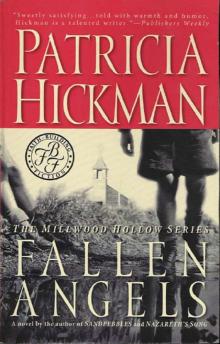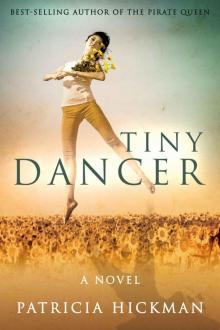- Home
- Patricia Hickman
Painted Dresses Page 5
Painted Dresses Read online
Page 5
“Tim says he remembers Truman,” said Fanny, pinching off a bite of cake and stuffing it in her mouth.
“I remember him returning to our house once,” I said. “Maybe I was eight. It’s hard to say.”
There was a faded photograph of a boy, large dark eyes, full lips, in my mother’s bureau drawer. “Maybe it was because of his picture, but I have this image of him only as a boy.” I kept his picture. Mother never framed any of his photos, but she was never that kind of domestic, setting many framed photos around the house. She was a busy woman working her job at Weyerhaeuser, not so full of children and husband as to make little photographic tributes for others to notice.
“Who we talking about now?” asked Delia.
“Truman, your brother,” said Fanny. “Do you remember him?”
Delia shrugged. “Hot coffee!” She poured a cup.
My headache came back strong in the front of my skull. Truman was never brought up at family gatherings, so hearing Fanny fire off one question after another was agitating.
“What do you remember about Truman?” asked Fanny.
“I asked my mother about him once,” I said. The pain medication relaxed me. I lifted my feet and rested them on the crossbeam beneath the table.
“It was because of one of those … what do you call it … regressive memories,” I said. By age seven, my arm bones had the extension capabilities of a small rhesus monkey, so stretching between the door frame of Mother’s room to touch the opposite door frame of Daddy’s room was proof that I was growing and not, as one aunt incorrectly speculated, the family midget. It was at that exact point, my right hand touching Mother’s entry, the left pointer finger pressed against Daddy’s, that I remembered.
“I can see him plain as day,” I said to Fanny, “a tall boy in that same hall space. He walked Delia and me to my father’s bed.” Because the mental snapshot had bubbled up from my memory from when I was age three, I surprised my mother when I told her about it. With the picture of this boy so lucid in my mind, I picked her brain. “It annoyed my mother when I brought up Truman’s name, but that was all the more reason to ask. My mother walked in at that same instant that I remembered, her arms holding a bundle of warm linens fresh off the line. It was morning, the windows open, a warm breeze blowing the curtains back a few feet out from Daddy’s bed. I told Mother, ‘I remember something. A boy standing here, tall and a teenager.’ She dropped the linens onto the sofa.”
“What did she say?” asked Fanny.
“She said, ‘That’s impossible,’ and ‘You were too young.’”
“It was Truman,” I said, but still didn’t know how I knew. “He showed Delia and me a biology kit or some such, like a dead frog. Mother explained that it once belonged to Aunt Tootie, so she even remembered the very day I recollected. Mother said she told him not to bring the kit into the house.”
“Like a dissection kit, sounds like, like from Aunt Tootie’s biology lab at school,” said Fanny.
“I told Mother, ‘You whipped him.’” Mother kept repeating that he deserved it. Her voice was shaking. When she was defensive, I felt a deep and abiding sympathy for her, too much to persist when she had had enough. That was Delia’s weakness, not knowing when to back off from Mother when she had had enough.
I expected Delia to respond, but she kept drinking.
Fanny glanced toward my mother’s bedroom. “You know I loved Aunt Fiona, Gaylen. But my mother said she wasn’t good to Truman back then.”
“You don’t know what to believe. The two of them didn’t get along. Besides,” I said, “Mother married Truman’s daddy too young and had him when she was only sixteen. She got into disagreements with everyone over him because she was so young.”
“He was a bad kid,” said Fanny.
“I don’t remember him as bad,” I said, keeping my voice low, my eyes fixed on Delia in the event she decided to blurt out something. “I don’t know why she beat him that day, but he must have done something to set her off like that.”
“It’s hard to remember back to age three,” said Fanny, swigging the last drink of her cooler. “I can’t remember seventh grade. What else do you remember?” she asked.
“He cried.” While I stared into my father’s bedroom, the picture of the three of us faded. A pain spiked through my head, but there was plenty of ibuprofen.
“I don’t remember,” said Delia, her brows knitting together in confusion.
“You were a baby, too young,” I said.
“Then so were you,” said Fanny. “Delia’s a year younger than you, right?”
“I remember,” I said. My mother was angry with him. She rushed into the room. She took Truman by the arm. She hit him and then kept hitting. He screamed.
“Are you all right, Gaylen?” asked Fanny. “You don’t have to tell us any more.”
“I’ve stayed up too late.” I rubbed my temples. “I shouldn’t have had that wine cooler.” The headache was back. “I don’t even drink. I don’t know what’s wrong with me.”
“Mother said Truman was a runaway,” said Delia.
Fanny glanced away.
“He’s our brother, Gaylen, and we ain’t even tried to write him,” said Delia, her voice cracking. The wine coolers were making her emotional.
“Should we?” asked Fanny. “Do we know what prison?”
“Angola. He could be out by now. Or back in.” I pulled out my bottom lip, thinking. “We don’t know him.”
“My mother used to call him the boy erased,” said Fanny. We all sat in silence for the time it took the coffee maker to beep and go off.
“Maybe Renni knows more,” I told Fanny.
“Don’t bring me up to Mama, Gaylen,” said Fanny, leaning forward and whispering. “And don’t tell her we were all sitting here talking about your mother. She’s finally at peace about your mother and all of the Syler squabbles. Let sleeping dogs saw logs and all that.”
The house creaked. Fanny and Delia kept laughing, arguing over the last wine cooler. Fanny started a game with Delia and me, challenging us to make a list of the top ten things you can do with Bundt cake.
“Am I drunk?” asked Delia. “Or are there twelve of them circle cakes sitting in a row? How in god’s name do people expect us to eat all them things?”
I set to work stacking up the girls’ empty plates with my one good hand.
4
A BAD DREAM came full blown right at dawn Thursday. I blamed Tim for talking about my nightmares, like he had summoned a bad dream right out of the night. I shot up out of my mother’s bed. The sheet was wrapped around my feet. My pajama top was soaked in cold sweat. Since I could not fall back to sleep, I got up to clean.
Fanny left with Dill and their four children. I drove Tim to the airport. It was along the way he got a call from Meredith. They were talking all the time, it seemed—when Tim woke up, during lunch, and again at midnight. Finally, after four years of trying, she announced right then over the phone that they were pregnant.
I told him, “You ought not to have signed up for the National Guard. If you get called away, what will Meredith do?”
“Im getting too old to get called up,” he said. He kissed me good-bye. I drove home.
Delia slept late.
I cleaned Daddy’s bedroom using bleach water to get rid of the medicinal smell. Then I sat down at the small desk in front of the window and pulled out Daddy’s bank statements and the will. He had always paid bills at that desk, yelling at Mother when he balanced the checkbook. It was their game. Mother was supposed to keep the pantry filled and clothes on our backs without the expenses showing up on the bank statement.
Renni said Mother once sold plasma to buy a Thanksgiving turkey. I remembered Mother raising a turkey right out in the garage, but it did not cost her a penny. That bird somehow worked his way off a poultry truck. Mother found i
t wandering the roadway, stunned, she said, as if addled by the fall off the truck. She threw Daddy’s fishing net right over its head and dragged it all the way down our driveway, corralling it finally in the garage. She never said anything about selling plasma. But Delia was telling it now for truth as if she herself sat at Mother’s side watching the blood fish down the tube.
I read the most recent bank statement. Daddy had saved up a quarter of a million dollars. In his will, he left me the executor, as well as the newly appointed guardian of Delia’s trust. Since I had been paying his bills for a year while he withered away to a pencil of a man, I knew about his stash. But having grown accustomed to his treatment of me as a clerk, I felt like a crook laying claim to it.
Delia crept down the hardwood floor in the hall and stuck her head inside the room. She wore only a long T-shirt ornamented with NASCAR driver Kyle Busch’s face. “You cleaning?” she asked.
I was bent over a baseboard beneath the windowsill. “I’m cleaning,” I said. “Smells like a nursing home or a hospital room around here.”
“Did you make coffee?” she asked.
“A half pot.”
She looked away.
“You want to move into the house? I mean, it’s empty. You might as well,” I said.
“I figured you’d want to live here, what with you and Braden splitting up.”
I came up on one knee and then stood. “We’re not splitting up,” I said, not so much defensively as to the point. It wasn’t her business. “I can help you move into the house.” Then I thought about her animals. “But maybe you ought to leave the chickens outside.”
“Sure, sure. It’s a good house and all, not for inside chickens. You mean it? I can live here?”
“We need to wrap the pipes for winter. I can help you do that.”
“This’d be my house then?” She kept asking, “You sure?”
“We’ll both own the house, of course. But you might as well live in it. Keep it up.” She was in a fix after her last bout with Leland. Her carpet had been pulled out after a sewer backup. She was walking around on the bare subfloor. That was when I moved her into the trailer. It was the last time I saw her until Daddy’s funeral. “I can make you a list of what to do. You’ll have to keep up the taxes. It’s not much,” I offered.
She yawned. “We got anything to eat around here? I’m starved.”
I kept cleaning until, bored, she left me to finish. I swept the baseboards and then pulled off the bed linens to launder. I was about halfway up the hall, holding the load to launder, when I heard a sound coming from the guest bathroom. I knocked on the door. “Delia? You in there?”
Cigarette smoke escaped under the door.
Mother hated smoking in the house so much that, after she died, my father continued taking his smokes outdoors. “It’s okay to smoke. I mean, if you’re going to live here, you can do that.”
She opened the door, grinning. She blew out a stream of tobacco smoke. “That’s right. It’s my place now.” She strutted out into the hallway, her cigarette dangling from the side of her mouth. She extended her arms as if she was about to dance. She was always a graceful girl, rather artful when it came to dancing. She twirled. Then she lifted her arms into the air, the wide grin never leaving her face. “My place, my place, Gaylen!”
“Houses are harder to keep up than trailers. You can’t let the lawn go to pot or leave garbage out.” She was bad about not carrying garbage out to the dumpster.
“I swear I’ll take good care of this place.”
“We’ve got some money from the inheritance. You can use it to fix up the house, if you want,” I said.
“Money?” She looked as if she didn’t know about the inheritance. She could have been playacting. It was her way. She would get this honest-to-goodness look about her of utter surprise, even when she knew the truth full well.
“We can go to the bank today if you want.” Daddy wanted the money split between us. But her trust was dependent on my agreement to make small deposits into her account each year.
“A new house and money all in the same day? What am I, rich or something?” She twirled again in her sock feet and then leaped, this time both legs extended in midair, landing nearly in an arabesque. Her heel slipped on the hardwood floor, and she fell backward. Her feet went up in the air and she yelled, “I broke something!”
I helped her to her feet. “You got any clothes you want to move over?”
“I know what I want. One of them aboveground swimming pools. Do I have enough for that?”
I didn’t know how to explain the trust fund without setting her off.
“I been needing me a suntan. This is the life, Gaylen. A house and a swimming pool and all the money I’ll ever need. I can quit my job at the furniture factory.” Hamby’s was the only employer willing to keep Delia on in spite of her outbursts and flights of fancy. She never knew that Braden had talked a friend of his into hiring her. “You need to keep your job, Delia. Besides, you’d get bored sitting around the house doing nothing.”
Her eyes drooped at the corners.
“You like the people at Hamby’s,” I said.
“I do,” she said. “We go out to the Waffle House at three in the morning, all us late shifters.”
Delia’s reputation around town was legendary. A lot of the stories about her tantrums and rages came from the Hamby employees, I realized, but she didn’t act as if she knew.
When we were girls, the town character was Ned Guillame. He climbed up onto the water tower after a group of high school boys told him that naked sorority girls could be seen each summer night performing a wiccan ritual on the twenty-yard line of the high school football field. After his death in 1985, Delia picked up his baton as blithely as an Olympic torchbearer.
I stuffed my father’s linens into the washer. Then I packed my suitcase, my overnight bag, and said, “Lets go and take a look at your place. We can decide what you can move to the house and what you can sell off.”
She slid into a pair of jeans while I started the load of linens. When I joined her, she was dragging an old steamer trunk through the kitchen. She wanted it, so I told her to take it, mostly because it was unlike her to care for family items of sentimental value. She shoved it into my car trunk. I placed my bags in the trunk too. We drove off, headed for her trailer.
We passed through downtown. Delia said, “I heard you yell early this morning. One of your bad dreams. What was it about?”
I had nearly forgotten about the nightmare. “Usually, I can’t figure out what I’m seeing. It’s as if I’m straining to see in the dark and something is scaring me, only I can’t see it. This one was different.” The shadow was crawling into my bed. “Usually I believe in my sleep I know what I’m seeing. Then I wake up and it’s washed away.”
Delia waved at the theater owner sweeping the walk in front of the new movie theater.
“But I remember this one. I was a baby again. Isn’t that odd? It was as if I opened my eyes and saw myself as an infant lying on a table.”
“Was you hurt?” she asked.
“I don’t know. I was afraid, and then I woke up screaming.”
“It’s your psychic self trying to tell you something.”
I was exhausted, though, as if I had not slept all night. “You’ll have to tell me when to turn. I haven’t been out to your place in a while.”
She directed me onto a country lane. There were few of that type of road left. So many roads in Boiling Waters were under renovation, being widened while new subdivisions sprang up on both sides of Fifty Lakes Drive. We drove past a horse farm and then turned again onto an unmarked and unpaved road. The road sign had gone missing, and the lane was shadowed by sycamore and oak that hid an old cemetery. The road snaked past three mobile homes, all of them prettily decorated with concrete yard art and circular flower gardens. The pansies w
ere still blooming, but down South, even if the weather brought a melting snow, winter pansies’ faces lifted like little girls frozen in the ice.
“Turn right into this next drive,” she said.
I drove around the mailbox that was off its perch and lying beside the drive. Two bare lawn-chair frames sat starkly out in front of the trailer. A flattened tire lay propped against the front porch steps. Empty beer cans were piled in a ceremonial heap at the foot of the stairs. Delia pushed them aside with her foot. She carried the long empty trunk inside, she said, to use for packing.
The sparse lawn out front was pungent as if spring was trying to sneak up from the soil. Not a bird sang overhead. I craved a sausage biscuit but not from Delia’s kitchen.
The single-wide was dark. I reached for a light switch.
“My lights was shut off for nonpayment,” she said. “I had the money, but it got took out of my purse. I don’t know by who.” She waved her hand in the air.
I knew that Freddy had taken it, the same as Ray and Leland. But when Delia was in the early stages of being dumped, denial was her pacifier.
I decided that I would show her a budget and how to plan out her spending so that she put aside enough money to pay the utility bills. I was lit up by the thought. My father had picked at Delia so much, I decided, that she had fallen into despair. What she needed was training. If she could train a dog to dust her tables, she could keep a checkbook balanced.
“If you’re careful, I can show you how to save a little aside every month so you can have your swimming pool,” I said.
She beamed. “You’d do that, Gaylen?”
“It takes time,” I said. I opened the window blinds, but yanked too hard. The blinds came loose from the frame and clattered to the floor.
“Who cares? The landlord can burn it all down, far as I’m concerned.” Delia lifted another blind and looked out. “My neighbor kept Porter overnight. I couldn’t stand to leave a new pup here in the dark. I’ll fetch him after I get my things.” She pulled her clothes off the hangers in her closet. She handed each piece to me, I assumed, so that I could fold them. I held up the first shirt. “This is a man’s shirt, Delia,” I said.

 Painted Dresses
Painted Dresses The Pirate Queen
The Pirate Queen Fallen Angels
Fallen Angels Earthly Vows
Earthly Vows Nazareth's Song
Nazareth's Song Whisper Town
Whisper Town Tiny Dancer
Tiny Dancer